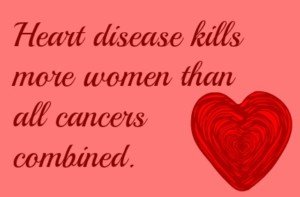
Young women shouldn’t have to worry about heart disease, right?
Well, they should definitely be aware of it, especially since it’s linked to depression in this very age group.
In young women (under age 40), researchers wanted to know if there was any connection between depression and in the risk of heart disease.
A study shows an alarming result: That depression in young women is a strong marker for future heart disease as well as the risk of dying from it. (Check the Archives of General Psychiatry, Nov. 2011 for the full report).
Past studies looked at the tie between depression and heart disease in older people.
This study, however, is the first to investigate the connection between depression and heart disease in younger adults.
According to the study, depression is a notable risk factor for heart disease in younger adults. The participants in the study were 17 to 39.
The study report explains that depression in women seems to be a bigger risk factor than the more traditional ones such as high blood pressure, smoking and obesity.
This statement is open to interpretation because obesity is an epidemic in the U.S., and it’s actually fairly common in young women.
Obesity is that of being at least 20 percent over one’s ideal weight.
For this study, data from over 7,600 people was analyzed.
Women with depression had a three times higher risk of succumbing to cardiovascular disease, and also a 14 times greater risk of dying from a heart attack.
An obvious conclusion is that women who are depressed are more apt to engage in lifestyle habits that cause heart disease such as smoking or unhealthy eating habits — which may include a high sodium diet — and excess sodium is bad for the heart, and can also cause high blood pressure.
However, the researchers corrected statistically for these variables, yet the link between depression and heart disease remained significant.
The research suggests that heart disease risk can be raised as a result of the physiological changes in the body that stem from depression, such as increased production of the stress hormone cortisol.
The “delicate inner lining of blood vessels” can be damaged by ongoing stress, says John M. Kennedy, MD, medical director of preventative cardiology and wellness at Marina del Rey Hospital, and author of the book, “THE 15-MINUTE HEART CURE: The Natural Way to Release Stress AndHeal Your Heart In Just Minutes A Day.”
Depression can easily lead to chronic stress, which in turn, agrees Dr. Kennedy, increases heart rate and blood pressure, and causes sticky thick blood – the recipe for the “perfect storm for a cardiac event,” he says.

 Double board certified in cardiovascular disease and also internal medicine,
Double board certified in cardiovascular disease and also internal medicine, 







































